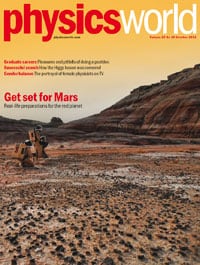By Matin Durrani

If you’re a member of the Institute of Physics, it’s time to tuck into the October 2012 issue of Physics World, which sees Michael Riordan continue his story of the search for the Higgs boson, taking us from the closure of the Large Electron–Positron collider at CERN in 2000 to the final, joyous days in July this year when the particle – or something like it – finally appeared at the Geneva lab. Elsewhere, PhD student Ashley Dale gives a riveting account of his two-week stay in the Utah desert, where he was part of a mission seeking to simulate a trip to Mars, which saw him do everything from riding on quad bikes to eating dehydrated food.
Don’t miss either our latest graduate special, where Physics World careers editor Margaret Harris examines the pitfalls and positives of doing a postdoc. Finally, we have a brilliant Lateral Thoughts article this month, in which Stephanie Walton describes her attempts to take a break from her PhD studies – and try her hand at writing a fully fledged crime novel. Physicists are a bright bunch; how hard could penning some fiction possibly be?
Members of the Institute of Physics (IOP) can access the entire new issue free online through the digital version of the magazine by following this link or by downloading the Physics World app onto your iPhone or iPad or Android device, available from the App Store and Google Play, respectively.
For the record, here’s a rundown of the highlights of the issue:
• Astronomy’s golden future – One year on from sharing the Nobel Prize for Physics for discovering that the expansion of the universe is accelerating, Brian Schmidt tells Jude Dineley why he thinks the future is bright for physics in Australia
• Courting controversy – A new independent analysis of global temperature records, led by Richard Muller, has found that humans are indeed contributing to climate change, but the result has proved contentious, as Philip Ball reports
• Critical point: How to vote – Ahead of the upcoming US elections, Robert P Crease describes his tactic for determining the qualifications of candidates
• Is the ‘Cox effect’ good for us? – Some claim that recent increases in the number of students studying physics in the UK are due to the TV appearances of physicist Brian Cox. But, as Felicity Mellor warns, the “Cox effect” may not be all good news
• My life on Mars – In December 2011 Ashley Dale spent two weeks in the Utah desert as part of a simulated Mars mission. This is his account of the experience
• Britain and the bomb – On the 60th anniversary of Britain’s first nuclear test, Richard Corfield explores how Operation Hurricane – the British effort to develop the atomic bomb in the 1940s and 1950s compares with states such as Iran that today wish to have such devices
• Cornering the Higgs boson – Michael Riordan continues his look back on the Higgs boson search with the early attempts to hunt it down at the Tevatron and the Large Hadron Collider
• Hans Bethe’s early life’ – Jeremy Bernstein reviews Nuclear Forces: the Making of the Physicist Hans Bethe by Silvan Schweber
• The science of Prometheus’ – Seymour Mauskopf reviews Roald Hoffmann: On the Philosophy, Art, and Science of Chemistry edited by Jeffrey Kovac and Michael Weisberg
• The academic pyramid – With the world economy struggling, physics graduates might be tempted to ride out the recession by doing a PhD or postdoctoral research. But as Margaret Harris reports, the academic sector has its own career problems
• My career as a crime novelist – In this month’s Lateral Thoughts column, Stephanie Walton muses on just how hard it could be to write a crime novel
If you’re not yet a member, you can join the IOP as an imember for just £15, €20 or $25 a year via this link. Being an imember gives you a full year’s access to Physics World both online and through the apps.



